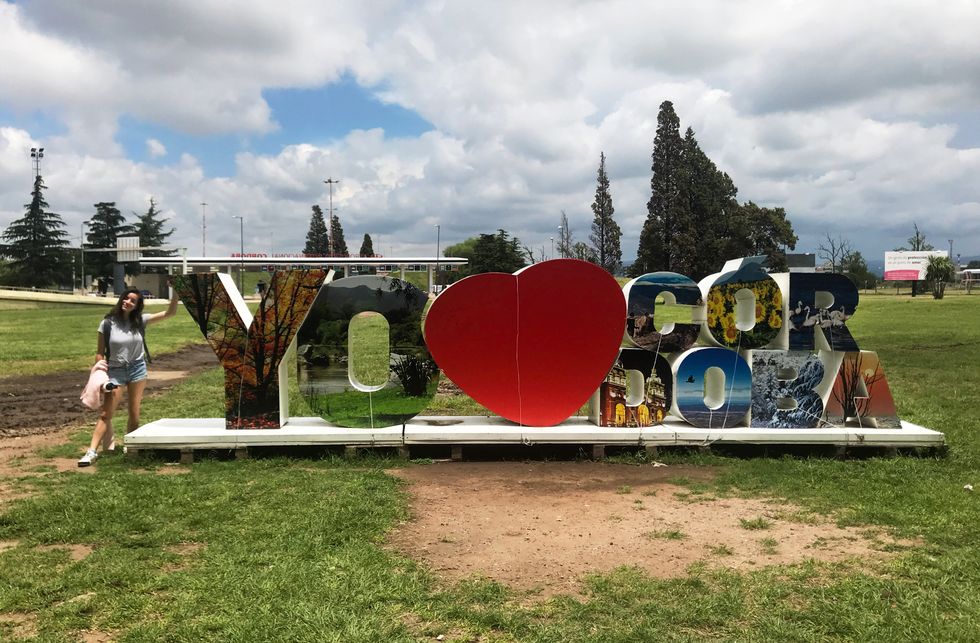My whole life, I have felt an internal strife between the culture of where my family is from and where I was raised. I've never felt like I was able to celebrate Hispanic Heritage Month or participate in the traditions and appreciate the culture from my birthplace. It's been difficult especially as I've gotten older to come to terms with my dual heritage and appreciate both sides of me, the Latina and the American.
I was born in Córdoba, Argentina in 2002 to parents who were born and raised there. In 2004, my mother earned a scientific fellowship in Washington, D.C., so we immigrated to the United States. Once the fellowship ended, we moved to California, where we've remained since.
When I was very young, my parents spoke entirely in Spanish to me, as they didn't know much English yet; I learned all of my English from my daycare teachers and classmates. I like to say English and Spanish are both my first languages because I learned them both simultaneously, however I am fluent in English but not in Spanish. I never was taught to read or write in Spanish, so I had to teach myself from what I experienced at home and the English writing and reading knowledge I have. I still don't know the proper grammatical structure of Spanish, nor where and when to place the special characters over letters, or even how to speak Spanish in a formal setting. My mom also proofreads my emails and texts to family members to let me know if I made a bad grammatical mistake.
By the time my sister was born in 2008, my parents knew more English, so they were comfortable speaking in both languages to my sister and I. At this point, I spoke almost entirely in English to my parents since that's what I spoke in school. At a young age, my sister was exposed to far more English than I was, so they know very limited Spanish compared to me and my parents.
Even though I have Argentine citizenship, speak the language well and was raised with a variety of cultural markers, I still feel strange labeling myself as Argentine. I'm not an Indigenous Argentinian person, so it's not my ethnicity, however Latino and Argentinian aren't races either, rather identities. It's hard to identify as Argentinian or Latina because I haven't been fully immersed in Argentine culture. I have had one foot in each culture my whole life, with a lot of Argentine influence at home and entirely American influence at school and elsewhere. It's difficult feeling this way at home because no one else can relate. My parents were born and raised in Argentina and my sister was born and raised in America. I'm truly at the crossroads between the two countries.
Living in California, I'm exposed to many other Hispanic and Latino people, often raised in more traditional families than I was, so they seem to fit the "Latino" box more than I do. Comparing their experiences to mine has made my cultural identity crisis worse, because my family has assimilated into American culture much more than others have. I didn't grow up watching telenovelas or listening to Spanish music every weekend while we clean the house. My mom prefers 70's and 80's rock and my dad likes smooth jazz and hard rock. Of course, they have their picks of Argentine music they like, but it wasn't a staple of my childhood like Queen and Evanescence were. I didn't even know about Argentine cuarteto, a very popular style of music from Córdoba until I visited my family in December 2019.
I often desperately wish I was raised in Argentina. Each time I have visited, I have felt a strong sense of belonging even though I only lived there for a year as a baby. Whenever I try to learn more and participate in the culture, I feel a sort of impostor syndrome and like I don't deserve to claim the culture since I wasn't raised in it. My family never fails to remind me of how different I was raised from them and each time I long for that life I never had more and more.
I also acknowledge and appreciate the privilege I have experienced as a white-passing, upper middle class Latina woman in the US. I do not have to worry about racism based off my skin color or broken English, because I am white and speak English fluently. I also have access to high-quality education and have never had to worry about food or housing for my family. For that, I am grateful. Argentina's political and economic situation is more precarious and gender-based violence is far more prominent than in the US. I would have a much harder time being respected as a female journalist and the freedom of the press is more limited than here.
For the other Hispanic Americans out there who are in a similar situation, I feel for you all. I love the Argentine traditions and culture I grew up around and long for those I haven't experienced, but I also feel lucky to live in a very highly developed country where I've been able to freely explore my identity and views more than I would have been able to in Argentina. It is completely valid to appreciate both cultures and identify with both. Even if you don't feel "enough" of your nationality and culture, it is and always will be part of you, so you have every right to participate in the traditions and claim them as part of your heritage. Hispanic Heritage Month is just as much for us as it is for those who feel more Latino than American, so appreciate and keep learning and teaching about your culture every year.



















